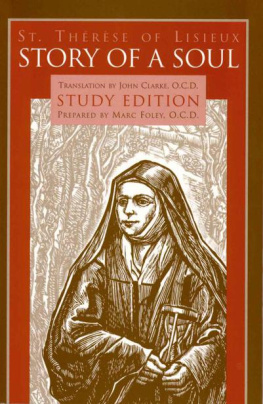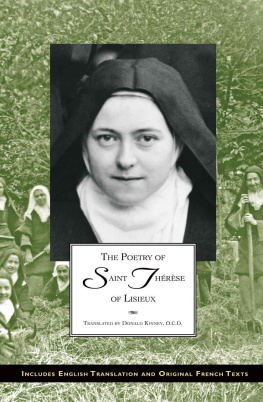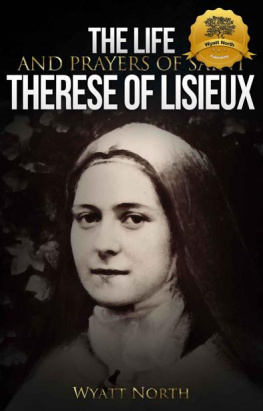INTRODUCTION
When Thrse of Lisieux "Irritates"or "Bores"
"Many things in this saint and her writingsirritate me or quite simply bore me. And if I set out to explain what nearlynauseates me, so that people would understand it, that still would not accountfor the fact that I took the trouble to do so. There are so many things in theworld to deal with that do not necessitate a long exegesis" (Karl Rahner).
So Thrse "irritates","bores", "nauseates"... That is clear from what therenowned Jesuit father writes.
Even shortly before thedeath of Saint Thrse, one of her companionshad said: "My Sister Thrse of the Child Jesus isgoing to die soon; and I really wonder what our mother will be able to sayafter her death. She will be very embarrassed, for this little sister, aslikeable as she is, has certainly done nothing worth the trouble of beingrecounted."
Onthe other hand, in 1939, Emmanuel Mounier, the founder of the journal Esprit, notes:
We have always experienced some difficulty inthe presence of the petit bourgeois style in which the heroism of this saint is clothed.But each time her life has given us the key of a total detachment. And in aperiod when the petitbourgeois spirit cannotfail to appear as the most dreary antithesis of the Christian life, would itnot be a trick of the Holy Spirit, a paradox of Mercy, to have hidden themysteries of the brightest flame under these banal appearances?
"A trick of theHoly Spirit"...
How are we to understand Thrse ofLisieux?
Do we not still cling tothe image of a "stupid nineteenth century"? Of what possible interestis a provincial petite-bourgeoise who enters the cloister?A spirituality inclined to the cult of suffering? An asceticism colored bycontempt for or flight from the world? Pious practices anxious to keep anaccounting of merits? A prayer apparently unaware of the "collective"or the "political"? A mentality that gives the impression of beingvictim to the distinction between the earth as a "valley of tears"and heaven, the sole center of interest? Poems of a rather insipid romanticism?Family traumas that would fall as much in the province of psychoanalysis as inthat of mysticism? The emotional inflation of a milieu yearning for spiritualrevenge, ready to adulterate, censor, slant texts and witnesses in order toobtain a canonization?
Who is Thrse of Lisieux? Theobjections are due to ignorance. The game is subtle. One makes up a prioriideas about her in order not to go and see, or else one restricts the readingof her to the prisms of the human sciences alone. After having read and rereadfor fifty years innumerable works about Thrse of Lisieux, Julien Green'sphrase in Le Bel Aujourd'hui comesto mind: "Last night I opened the large volumes by Canon Ribet onmysticism. He was honest enough to tell us, from the very first pages, that hehad never experienced any of the things that he was going to describe. Inshort, he proposed to write a book about China , where he had never set foot,on the basis of works others had written about that country." And Greenconcludes: "I prefer to go back to Saint Thrse, whomade the voyage herself." Dare we say that the following pages have noother purpose but to open the book of the life and writings of Thrse ofLisieux in order to invite the reader to that voyage?
Thrse herself would say: Thrse isof little importance... But what is at stake is one of the most certain andsimplest evangelical shortcuts ever proposed.
A trick of the Holy Spirit: Yes, God used andstill uses Thrse of Lisieux. According to my calculations, itwould take scarcely half the time to read what is essential in what Thrse ofLisieux said and wrote as it would to read a long Russian novel ! We witnessthe battle of death and despair with childhood and innocent misfortune, thestruggle between darkness and faith, humor and sadness, realism and pretense,maturity and childhood... One of the most vivid books in existence is atissue here. Recommended by providence. Contemporary. The life, words, and textsof Thrse are of an astonishing freshness, accuracy, immediacy,strength, and genius under the "banal appearance".
We should be on ourguard: she does not cheat. She poses the most serious and the most unavoidablequestions in all life:
Why death? And it is alittle girl four years old who asks this question.
How to live in hope tothe end? And it is a young girl twenty-four years old who asks this questionduring eighteen months of agony.
Must we be afraid of thebeyond? Can we experience questions in faith?
How to be shaken and yetremain faithful, and do so with joy?
Why suffer if one loves?And first, how to love?
Forone hundred years, Thrse has been replying.
1897:Jubilee of Queen Victoria
On June 20, 1897, a young eight-year-old Britishboy, who was to become one of the authorities on the history of the twentiethcentury, was seated with his father at a window on Fleet Street , London ,in order to watch the troops march past in honor of the diamond jubilee ofQueen Victoria 'sreign. He would remember this fifty years later while pondering time andhistory in some memorable pages. At the same moment, Thrse ofLisieux, surrounded by the certainty of her death, which she had known to beirreversible for ten days, expressed herself pointedly:
On June 9, I saw very clearly the beacon thatwas announcing to me heaven s port; but now I nolonger see anything. It's as if my eyes were blindfolded.... What anyonesays to me about death no longer penetrates; it slides over me as it would oversmooth glass. It's finished! The hope of death is all used up.... God willsthat I abandon myself like a very little child who is not disturbed by what otherswill do to him. (LC June 15, no. 1, p. 65)
In Civilization on Trial, the great historianArnold J. Toynbee is pondering, then, those days of June 1897, an assessment ofthe longest reign of the British empire , atthe very moment when Thrse was fighting with death.He writes:
Where does mankind stand ... ? This question nodoubt concerns the whole living generation throughout the world; but, if itwere made the subject of a world-wide Gallup Poll, there would be no unanimityin the answer.... To whom is our question being addressed? For example, thewriter of the present paper is a middle-class Englishman.... He knows thathis fleeting and fragmentary vision of the passing scene is no more than acaricature of the surveyor's chart. God alone knows the true picture....
The writers mind runsback fifty years, to an afternoon in London in the year 1897. He is sitting with his father at a window in Fleet Street andwatching a procession of Canadian and Australian mounted troops who have cometo celebrate Queen Victoria 'sDiamond Jubilee. He can still remember his excitement at the unfamiliar,picturesque uniforms of these magnificent "colonial" troops, as theywere still called in England then: slouch hats instead of brass helmets, grey tunics instead of red. To anEnglish child, this sight gave a sense of new life astir in the world; aphilosopher, perhaps, might have reflected that, where there is growth, thereis likely also to be decay.... The English crowd gazing at that march pastof overseas troops in London in 1897... saw their sun standing at its zenithand assumed that it was there to stay.... The middle-class English in 1897,who thought of themselves as Wellsian rationalists living in a scientific age,took their imaginary miracle for granted. As they saw it, history, for them,was over. It had come to an end in foreign affairs in 1815, with the Battle ofWaterloo; in home affairs in 1832, with the Great Reform Bill; and in imperialaffairs in 1859, with the suppression of the Indian Mutiny. And they had everyreason to congratulate themselves on the permanent state of felicity which thisending of history had conferred on them.... Viewed from the historicalvantage point of [fifty years later], this fin desicle middle-class English hallucination seems sheer lunacy, yet it was shared bycontemporary Western middle-class people of other nationalities.In the United States, for instance, in the North, history, for the middleclass, had come to an end with the winning of the West and the Federal victoryin the Civil War; and in Germany, or at any rate in Prussia, for the sameclass, the same permanent consummation had been reached with the...foundation of the Second Reich in 1871. For these three batches of Westernmiddle-class people fifty years ago, God's work of creation was complete,"and behold it was very good."
Next page
